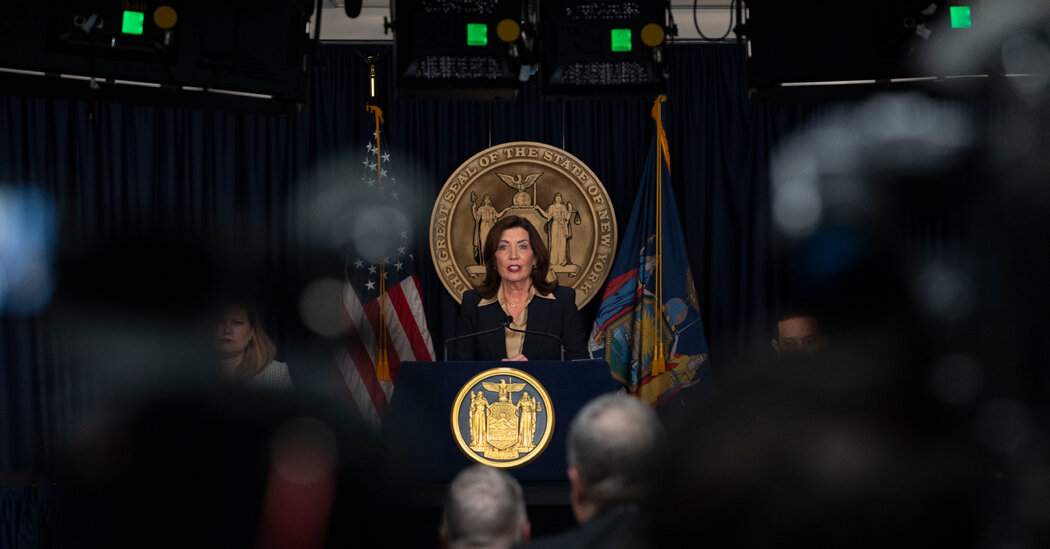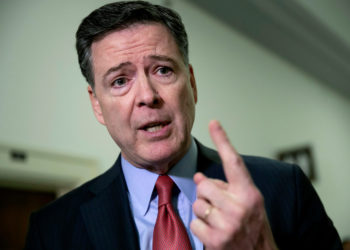When President Trump extended his reach into New York’s affairs with a promise to “kill” the state’s congestion pricing plan, Gov. Kathy Hochul drew her sword.
“We are not subservient to a king or anyone else out of Washington,” Ms. Hochul, a Democrat, told reporters, vowing to preserve the program.
The aggressive stance was at odds with Ms. Hochul’s usual, deliberative approach, but it also seemed to be successful: Two months later, the tolling program’s cameras remain on.
So when the Trump administration declared it would take over one of the state’s largest and most complicated infrastructure projects, Penn Station, some were surprised that Ms. Hochul appeared to respond not with defiance but with a kind of artful gratitude.
“I want to thank the president and Secretary Duffy for taking on the sole responsibility to deliver the beautiful new $7 billion station that New Yorkers deserve,” her statement read, referring to the transportation secretary, Sean Duffy. She suggested that the move was a “major victory for New Yorkers,” in part because she asserted that the state would no longer be contributing a previously allotted $1.3 billion to the project.
It remains to be seen how Ms. Hochul’s approach, which called to mind former House Speaker Nancy Pelosi’s performative clapping at Mr. Trump’s State of the Union address in 2019, will play out for Ms. Hochul and the people of New York.
For the most part, Ms. Hochul has tried to build a relationship with the famously retaliatory president. Shortly after his election in November, the two spoke about the future of New York City transportation. Ms. Hochul reportedly pitched Penn Station as an area where the two could collaborate, even making what her staff described as a “lighthearted joke” about renaming the station after Mr. Trump.
But Mr. Trump’s low threshold for dissent, combined with his repeated incursions on civil rights that New Yorkers hold dear, seem destined to bring the two into further conflict.
And although the future of congestion pricing program may yet be decided in court, the Trump administration has already begun to slash federal funding and approval for other projects affecting New York, ranging from FEMA climate mitigation projects to the construction of wind turbines off the coast of Long Island.
Representatives for the governor did not immediately respond to a request for comment on Friday.
For decades elected leaders and transit advocates have sought to redevelop Penn Station, with numerous plans debated and discarded. Major issues still remain unresolved, including funding and the fate of Madison Square Garden, which sits directly above.
As of Friday, few details had emerged about the Trump administration’s plans for the site. A spokesman for the Department of Transportation declined to answer any specific questions about the project, saying only: “Even Governor Hochul agrees that the M.T.A. is too much of a mess to handle a project of this size and national importance.”
Up until now, the project has been controlled by the state-owned Metropolitan Transportation Authority, which oversees the city’s subways and buses. The agency’s finances — especially with congestion pricing at risk — are often perilous, raising questions of whether it should be in charge of a project as expensive and complex as the Penn Station redevelopment.
The Trump administration wants the project to be controlled by Amtrak, which owns Penn Station and is controlled by the federal government. Amtrak has overseen similar station renovation projects in Washington, D.C., and Philadelphia.
Some, like Representative Nicole Malliotakis, a Republican who represents Staten Island, welcomed the news that the federal government would take a more active role, pointing to the M.T.A.’s long history of mismanagement and construction overruns.
Kathryn S. Wylde, president of the Partnership for New York City, a business group, said that Mr. Trump has shown a keen interest in high-profile civic projects dating back to his efforts to renovate Central Park’s Wollman Rink in the 1980s.
Mr. Trump “loves that showmanship, and he loves to be associated with high-profile projects that have stymied everyone else,” she said.
Penn Station was in many ways, the ultimate challenge, she said, and praised Ms. Hochul for how she has handled the situation.
“She has little ego involvement in owning the infrastructure,” Ms. Wylde said. “If the federal government is willing to pay for it, that’s great.”
But others noted the risk associated with more federal involvement.
“I got lots of emails right after the announcement from allies saying: ‘God bless. Let Trump pay for this white elephant’,” said John Kaehny, the executive director of Reinvent Albany, a watchdog group.
Even so, he said, the investment could make New York more reliant on the federal government, noting that the M.T.A. had long rented the station from Amtrak, and was always vulnerable to rent increases.
Polly Trottenberg, the former deputy transportation secretary under President Biden and a former New York transportation commissioner, also urged caution in light of the layoffs at the Transportation Department and Federal Railroad Administration.
“There is clearly support for a strong federal leadership role in one of the most challenging and important transportation projects in the country,” she said. “But a deep investment and a spirit of collaboration will be necessary.”
Stefanos Chen contributed reporting.
Grace Ashford covers New York government and politics for The Times.
Benjamin Oreskes is a reporter covering New York State politics and government for The Times.
The post In Face of Trump’s Hostility, Hochul Responds With Barbed Gratitude appeared first on New York Times.




